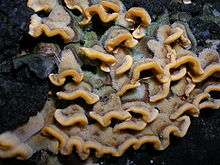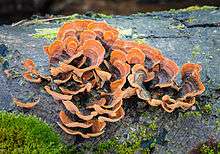Stereum
Stereum is type genus of the Stereaceae family of fungi, in the Russulales order. Until recently, the genus was classified in the Corticiaceae family, of the Corticiales order. However, it was given its own family as a result of the split-up of the Corticiales. Common names for species of this genus include leaf fungus, wax fungus, and shelf fungus. Fungi having a shape similar to a Stereum are said to have a stereoid shape. Stereum contains 27 species that have a widespread distribution.[3]
| Stereum | |
|---|---|
 | |
| Stereum hirsutum - false turkey tail | |
| Scientific classification | |
| Kingdom: | Fungi |
| Division: | Basidiomycota |
| Class: | Agaricomycetes |
| Order: | Russulales |
| Family: | Stereaceae |
| Genus: | Stereum Hill ex Pers. (1794) |
| Type species | |
| Stereum hirsutum | |
| Synonyms[1] | |
Habitat
Stereum species are found to live on all kinds of deadwood or hardwood or dead leaves (they are therefore said to be saprobic). Sometimes they are also found on living leaves.
Characteristics
Stereum species are wood decay fungi. Their simple, shelving fruiting bodies have a smooth hymenium, lacking gills or tubes. Like most members or the family Stereaceae, Stereum fruiting bodies lack clamp connections and produce amyloid basidiospores.
The species can be divided into two groups: the bleeders (those that exude a red liquid from cut surfaces, similarly to Lactarius species) and the non-bleeders (those that do not). In 1959, Zdenek Pouzar created a distinct genus, Haematostereum, for the bleeding species of Stereum, including H. gausapatum, H. rugosum, and H. sanguinolentum.[2] Modern authors do not consider Haematostereum to be a distinct genus, so it is currently treated as a synonym of Stereum.[1]
Species

There are numerous species in this genus (and family), the commonest one being by far Stereum hirsutum.
- Stereum acanthophysatum
- Stereum adnatum
- Stereum albostipitatum
- Stereum alternum
- Stereum antarcticum
- Stereum aotearoa
- Stereum aratum
- Stereum armeniacum
- Stereum auriscalpium
- Stereum aurora
- Stereum avellanaceum
- Stereum azonum
- Stereum bagliettoanum
- Stereum beigehymenium
- Stereum bellum
- Stereum bombycinum
- Stereum boninense
- Stereum braunii
- Stereum burtiasmum
- Stereum burtissimum
- Stereum campaniforme
- Stereum carthusianum
- Stereum complicatum
- Stereum cupulatum
- Stereum durum
- Stereum earlei
- Stereum elongatum
- Stereum fasciatum
- Stereum gausapatum
- Stereum hirsutum
- Stereum insignitum -- may be considered a synonym of Stereum subtomentosum
- Stereum ostrea -- False turkey tail. Sometimes considered a variety of *Stereum hirsutum.
- Stereum papyrinum -- Preferred name: Lopharia papyrina[4]
- Stereum purpureum -- Silver leaf fungus. Preferred name: Chondrostereum purpureum [4]
- Stereum rugosum
- Stereum sanguinolentum
- Stereum subtomentosum
- Stereum taxodii -- Preferred name: Laurilia taxodii[4]
References
- "Synonymy: Stereum Hill ex Pers". Species Fungorum CAB International. Retrieved 2014-03-04.
- Pouzar Z. (1959). "New genera of higher fungi III". Ceská Mykologie. 13 (1): 10–19.
- Kirk MP, Cannon PF, Minter DW, Stalpers JA (2008). Dictionary of the Fungi (10th ed.). Wallingford, UK: CAB International. p. 665. ISBN 978-0-85199-826-8.
- See the entries in Index Fungorum for the current names and synonyms.
| Wikimedia Commons has media related to Stereum. |